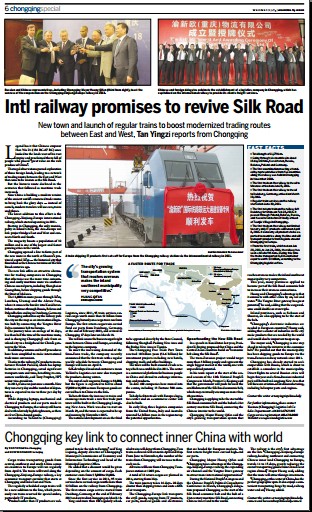渝新歐鐵路貫通歐亞大陸 推動兩江新區對歐貿易
2014-04-01 13:50:57
Landbridge平臺

渝新歐鐵路貫通歐亞, “絲綢之路”煥發生機
傳說中,中國漢武帝(公元前156-87)曾經站在自己廣袤的帝國向西望去,大膽預測那片土地上的人們對中國的產品有非常巨大的需求。
皇家的觀察立刻激發了人們對那片陌生土地的探索,從此開辟了一條由東往西的貿易通道“絲綢之路”。
但是隨著航運貿易的發展,這條陸上古道漸漸衰落。
現在,中國正準備重新打造這條世界著名的貿易通道,讓它煥發昔日的光輝。在這條道路上,我們不會再見到駱駝商隊,現代的旅行者將搭乘汽車,火車和飛機來往于歐亞大陸。
2011年始運的重慶-新疆-歐洲(渝新歐)國際鐵路就是一個最新的例子。
重慶是中國內陸唯一的直轄市,也是這條歐亞大通道的起點,貫穿東西,連接南北。
這座巨大型城市擁有3200萬人口,是世界上最大和發展最快的城市之一。
渝新歐鐵路向北連接了古絲綢之路的起點陜西省西安市,這座古城在數百年前曾因絲綢之路而興盛繁榮一時。
這條新通道為重慶的對外貿易公司提供了比海運更加經濟、便捷的運輸選擇。以前,外貿公司的貨物必須通過中國南方的沿海城市,比如上海和廣州,穿行馬六甲海峽,然后才能到達歐洲。
許多國際物流公司,比如DB Schenker全球國際貨運代理(中國)有限公司和Far East Land Bridge遠東陸橋公司, 已經使用這條通道運輸把集裝箱從重慶運送到歐洲的港口,比如德國的杜伊斯堡。
這條全長11000多公里的鐵路途經西安,蘭州,烏魯木齊,阿拉山口,穿越邊境到達哈薩克斯坦境內。然后繼續穿越俄羅斯,白俄羅斯和波蘭抵達德國的杜伊斯堡。
重慶市領導說這條渝新歐國際鐵路使重慶成為國際物流的中心之一,將長江經濟帶和歐洲緊密相連。
通過這條鐵路,重慶到歐洲平均只要16天時間,比起海運起碼快了一倍以上。從此,重慶從一個內陸城市變成為中國向西開放的橋頭堡。
此外,重慶和多方合作協商,極力簡化了海關和稅收流程,讓國際貿易更見便捷。
惠普公司的高級副總裁Tony Prophet說,由于這條渝新歐鐵路,在重慶生產的惠普筆記本電腦能更快更便宜地到達全球客戶手中。
在2011,渝新歐鐵路只是一月開行一班。到現在已經是每天一班,預計到2015年,能夠達到每天三班。
渝新歐鐵路現在主要是運輸重慶制造的筆記本電腦、機械電子產品和汽車零配件到歐洲去。但是由于運回中國的貨物還比較少,所以現在的運輸成本還比較高。
根據渝新歐物流有限公司提供的數字,從2011年1月28日首趟班列開行至今,共開行了96趟班列(其中回程班列1趟),從重慶運送了超過20億美元的貨物。貨物運輸總量達到8400標箱,貨物運輸周轉量達到9000萬標箱公里,是目前開通時間最早、開行數量最多的中國到歐洲的貨運班列。
回程班列運送的是長安福特的汽車零配件,從德國的杜伊斯堡出發,歷經17天,在2013年3月18日到達重慶。
為使渝新歐國際鐵路聯運大通道更加適應中歐貿易往來的需要,進一步擴大渝新歐的輻射作用和影響力,重慶決定從4月8日開始開行公共班列,并且要開行往返班列。所謂公共班列即是每周按固定時間準時發車,同時服務于各類有運往歐洲或從歐洲返回貨運需求的企業和產品。
同時,渝新歐鐵路冬天不再停開。自主研發的保溫集裝箱意味著渝新歐物流公司可以在冬天運輸貨物了。
現在每車貨物的運費大約為8000美元,但是隨著回程貨物的增多,價格將有望降到5000到6000美元左右。
為了充分發揮渝新歐鐵路大通道和國家級開發開放平臺優勢,重慶兩江新區將打造一個全新的自由貿易港城。
重慶自由貿易港城將于3月29日正式開工建設,預計2015年11月竣工。
重慶兩江新區是繼上海浦東新區、天津濱海新區后,國務院直接同意批復的第三個國家級新區。
重慶自由貿易港城投資近100億人民幣,包括酒店、大型購物中心和寫字樓等。
這個貿易自由港城是在重慶保稅商品展示交易中心基礎上建立的。2011成立的這個交易中心是為境內外客商匯集進出口商品、信息、技術的綜合性商務平臺。
目前已有400余家企業的入駐,其中涵蓋世界500強企業13家,港區年產值超過700億元。
為了加強對歐貿易,自由港城還會建立一個物流中心和電子商務中心。
2013年5月,來自美國、意大利和澳大利亞的物流公司已經在重慶投資了540億元人民幣,搶占渝新歐國際鐵路的先機。
搶占新絲綢之路橋頭堡
去年,習近平主席在哈薩克斯坦的一次演說中提議中國和中亞國家應該共同建立“絲綢之路經濟帶”。這個橫跨亞歐的戰略將覆蓋超過全球30億人口,該經濟帶將成為舉世無雙的全球單一最大市場。
李克強總理在今年兩會期間的工作報告中指出中央政府將積極促進“絲綢之路經濟帶”的建設,該經濟帶將最終涵蓋超過40個國家。
重慶正積極申請成為“絲綢之路經濟帶”的起點和“海上絲綢之路”的中心,連接中國內陸和世界。
重慶市長黃奇帆說,不斷壯大的運輸系統將這個直轄市與海外市場緊密連接,使重慶非常具有競爭力。
今年,為了增加與海外的交流,許多省市都在申請成為“絲綢之路經濟帶”的一部分。
黃市長說重慶的優勢在于水陸空的立體運輸系統。
“長江航運有巨大潛力,”他說。而且,他說今后貨物運輸量將兩三倍的增加。
其他內陸省份,如四川和陜西,也在申請成為“絲綢之路經濟帶”的起點。
“歐洲國家需要重慶的電子產業,”黃市長說。同時,他說,重慶的產業集群完善,產品受到全世界的歡迎。
“在建設絲綢之路經濟帶的戰略上重慶已經占領了先機,”黃市長指出,重慶早在2011年就開始通過渝新歐鐵路往歐洲運送貨物了。
重慶已經開始和俄羅斯進行合作,內容包括在渝設立領館。今年將開通重慶到俄羅斯幾大城市的直航班機。同時,重慶兩江新區將建立中俄產業園,重點打造航空制造產業,包括直升機零部件和引擎。
continental railway promises to revive Silk Road
Standfirst: New town and launch of regular trains to boost modernized trading routes between East and West
By Tan Yingzi in Chongqing
Legend has it that Chinese emperor Han Wu Di (156 BC-87 BC) once looked to the lands west of his vast empire and proclaimed them full of people who placed "great value on the rich produce of China".
That regal observation spurred exploration of those foreign lands, leading to a network of trading routes between the East and West that came to be known as the Silk Road.
But the historic route declined in the centuries that followed as maritime trade increased.
Now China is building a modern version of the ancient world's renowned trade routes to bring back the glory days — instead of camels, modern travelers will use cars, trains and planes.
The latest addition to this effort is the Chongqing-Xinjiang-Europe international railway, which started operating in 2011.
Starting in Chongqing, the only municipality in inland China, the Asia-Europe rail link project bridges East and West and connects North and South.
The megacity boasts a population of 32 million and is one of the largest and fastest growing cities in the world.
Chongqing opened a line to form part of the new route in the north at Shaanxi's provincial capital Xi'an — the historical city that flourished as the Chinese terminus of the Silk Road centuries ago.
The new link offers an attractive alternative for trading companies in Chongqing that otherwise use the more time consuming and costly maritime route via southern Chinese coastal ports, including Shanghai or Guangzhou, before shipping goods through the Strait of Malacca.
Logistics companies such as DB Schenker and Far East Land Bridge already use the land route to transport containers between Chongqing and European ports like Duisburg in Germany's Ruhr industrial belt.
The 11,000 km route passes through Xi'an, Lanzhou, Urumqi and the Alataw Pass, where it crosses the border into Kazakhstan. It then continues through Russia, Belarus and Poland before ending in Duisburg, Germany.
Chongqing authorities say the railway puts the city on the map as an international logistics hub by connecting the Yangtze River Delta economic belt to Europe.
The journey takes an average of 16 days, less than half the time of the maritime route, and is changing Chongqing's role from an inland city to a bridgehead for China's gateway to the West.
In addition, customs and tariff procedures have been simplified to make international trade more convenient.
Thanks to the railway, PC products manufacturer Hewlett Packard, which has laptop factories in Chongqing, saved significant transport costs and time, benefiting its consumers worldwide, said Tony Prophet, HP's senior vice-president.
In 2011, trains ran just once a month. Now they run every day and the number of departures is expected to rise to three per day by 2015.
While shipping laptops, mechanical and electrical products and car parts made in Chongqing to Europe, the railway still has to deal with relatively high freight costs, as there are few China-bound goods.
According to YuXinOu (Chongqing) Logistics, since 2011, 95 train services carried cargo worth more than $2 billion from Chongqing but only one cargo train ran from Europe. The first return cargo train carried Ford car parts from Duisburg, Germany, at the end of February 2013, and arrived in Chongqing 17 days later on March 18.
The rail link is now the busiest cargo freight route between China and Europe, according to the logistics company.
To meet the increasing demand of the Sino-Euro trade, the company recently announced that the first train with a regular weekly schedule between Chongqing and Europe will leave on April 8.
Self-developed insulated containers mean YuXinOu Logistics can now also transport the products during winter.
The cost of each wagon to Europe is $8,000, but the figure is expected to fall to about $5,000 to $6,000 as more European goods are carried back to China via the link.
To benefit from the increase in trains and encourage more trade a new free trade port town will be built in the Chongqing Liangjiang New Area.
Work was due to start on March 29, and the town is expected to be up and running by November 2015.
The national development area is the third to be approved directly by the State Council, following Shanghai's Pudong New Area and the Binhai New Area in Tianjin.
The Chongqing Free Trade Port Town received 10 billion yuan ($1.6 billion) for investment projects including new hotels, shopping malls and office buildings.
The town will be built around a trade center, which was established in 2011. The center is a commercial platform for business people in China and abroad to exchange information and products.
To date 400 companies have moved into the center, including 13 Fortune 500 companies.
To help facilitate trade with Europe a logistics center and an e-commerce center will also be built.
In early May, three logistics companies from the United States, Italy and Australia invested 5.4 billion yuan in the region to tap the potential opportunities.
Spearheading the New Silk Road
In a speech in Kazakhstan last year, President Xi Jinping proposed that China and the Central Asian countries build an "economic belt along the Silk Road". The trans-Eurasian project would target more than 3 billion people and represent the single biggest market in the world, one with unparalleled potential.
In his work report at the start of the second session of the 12th National People's Congress in March, Premier Li Keqiang said that the government will push forward the establishment of the Silk Road economic belt, which may eventually encompass more than 40 countries.
Chongqing is applying to be the start of the Silk Road economic belt and the hub of a 21st century maritime Silk Road, connecting the Chinese interior to the world.
Chongqing Mayor Huang Qifan said the city's growing transportation system that reaches overseas makes the inland southwest municipality very competitive.
This year, many provinces applied to become part of the Silk Road economic belt to increase their overseas connections.
Huang said Chongqing's advantage is that it connects with other cities by air, rail and water.
"The Yangtze River gateway has great potential," he said, adding that the cargo volume could double or even triple.
Inland provinces, such as Sichuan and Shaanxi, are also applying to be the start of the belt.
"Chongqing's electronic industries are needed in European countries," Huang said, adding that a cluster of industries in the city make products that are needed by the world and would also be important to open up.
The mayor said, "Chongqing is one step ahead in taking the initiative in the economic belt." He pointed out that the municipality has been shipping goods to Europe via the trans-Eurasian railway network since 2011.
Chongqing has already started to seek cooperation with Russia, which is about to establish a consulate in the municipality. Direct flights to several Russian cities will begin this year and a Sino-Russian industrial park will be built in Liangjiang New Area that will focus on aviation-related manufacturing, including helicopter parts and engines.
渝新歐鐵路大事記
1. 全長11,179km。
2. 16天穿越6個國家:中國,哈薩克斯坦,俄羅斯,白俄羅斯,波蘭和德國.
3.2010年11月,“渝新歐”首次五國六方協調會在重慶舉行,確定以班列的形式開行。
4.2011年1月28日,首次開行到莫斯科。
5.2011年3月19日,首次開行到德國杜伊斯堡。
6. 2011年6月30日,首次以班列形式常態化開行。
7. 2013年2月28日,首趟渝新歐回程班列(長安福特專列)從德國杜伊斯堡車站開出,經過波蘭、白俄羅斯、俄羅斯、哈薩克斯坦,最終到達中國重慶團結村。
8. 2014年4月8日,渝新歐將開行首趟公共班列,改變以往多是IT專列的情況。所有需要出口到渝新歐沿線的產品,都可以搭乘此通道。同時,不僅是重慶的企業和貨物可以,重慶周邊地區的貨物,都可以搭乘渝新歐直達歐洲。
9.據重慶市物流辦數據,渝新歐自2011年1月28日開通以來,截至2014年1月24日,已經成功開行96趟班次,其中去程95班,回程1班,外貿貨物運輸總量達8434標箱,出口貨值超過30億美元。
Fast Facts
• Total length of 11,179 km.
• Going through six countries in about 16 days: China, Kazakhstan, Russia, Belarus, Poland and Germany.
• The first coordination meeting attended by representatives from five countries along the railway was held in Chongqing in November 2010.
• The first train on the railway to travel to Moscow arrived on Jan 28, 2011.
• The first train on the railway to travel to Duisburg, Germany, arrived on March 19, 2011.
• Regular train services on the railway started on June 30, 2011.
• The first return train on the railway left Duisbrug for China on Feb 28, 2013. It passed through Poland, Belarus, Russia, and Kazakhstan before it finally arrived at Tuanjie Village in Chongqing.
• The first train on the railway not limited to carry only IT products will run on April 8, 2014. It can carry all products to be exported to countries along the line and will transport products from regions around Chongqing to Europe.
• From the first train, which ran on Jan 28, 2011, to Jan 24, 2014, the railway has seen a total of 96 runs. During this time the trains transported 8,434-container exports worth $3 billion, according to the Chongqing logistics office.
版權與免責聲明:此稿件為引述消息報道,稿件版權歸原作者所有,Landbridge平臺不對本稿件內容真實性負責。如發現政治性、事實性、技術性差錯和版權方面的問題及不良信息,請及時與我們聯系,并提供稿件的【糾錯信息】。糾錯熱線:0518-85806682

Landbridge平臺常務理事單位
- [常務理事單位] 沈陽陸橋國際貨運代理有限公司
- [常務理事單位] 湖南中南國際陸港有限公司
- [常務理事單位] 成都厚鯨集裝箱租賃有限公司
- [常務理事單位] 湖南德裕物流有限公司
- [常務理事單位] 安德龍國際物流集團
- [常務理事單位] 重慶逆鋒國際貨運代理有限公司
- [常務理事單位] 陜西遠韜供應鏈管理有限公司
- [常務理事單位] 天津海鐵聯捷集團有限公司
- [常務理事單位] LLC ST GROUP
- [常務理事單位] 宏圖集裝箱服務有限公司
- [常務理事單位] 哈薩克斯坦Falcon
- [常務理事單位] 青島和泰源集裝箱堆場
- [常務理事單位] 俄羅斯戰艦國際貨運代理有限公司
- [常務理事單位] 青島亞華集裝箱堆場
- [常務理事單位] 海晟(上海)供應鏈管理有限公司
- [常務理事單位] 俄羅斯西格瑪有限責任公司





